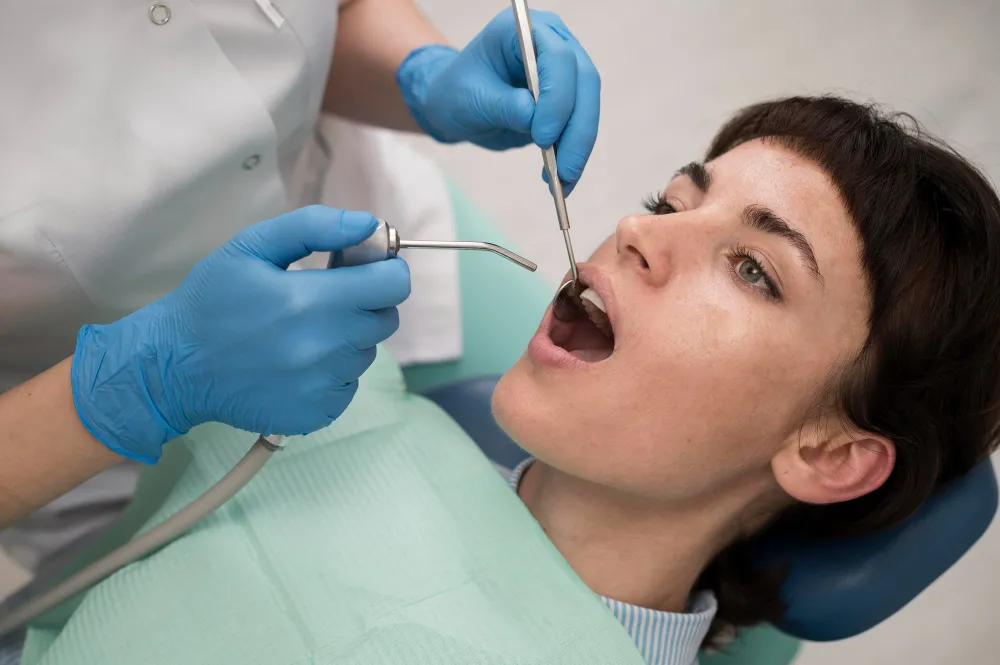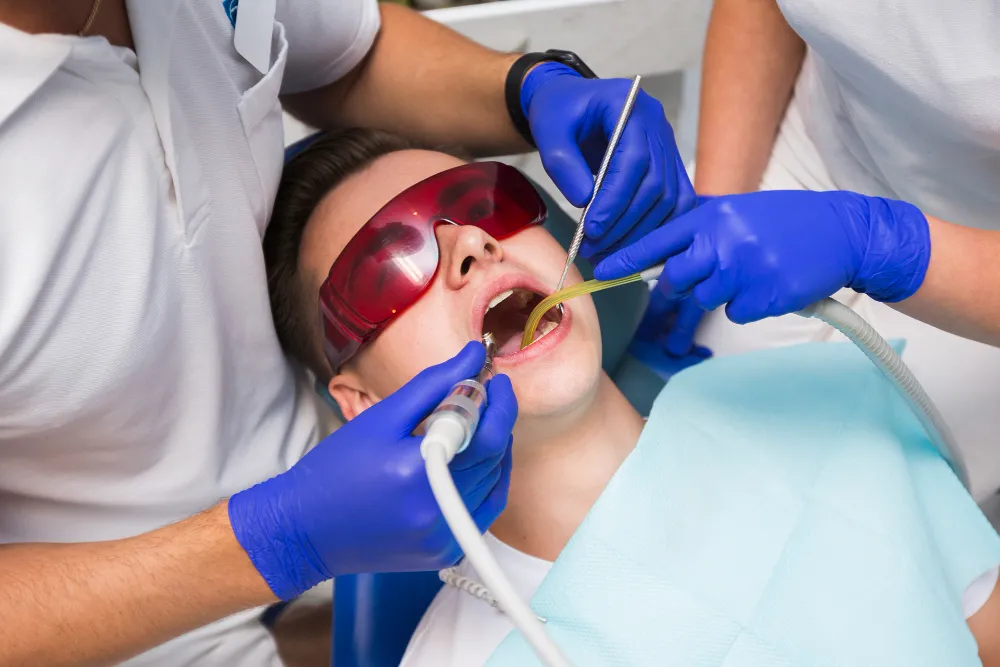Wisdom Tooth Extraction: What to Expect Before, During, and After
The thought of having your wisdom teeth removed can be a little intimidating, but for many people, it’s a necessary step to maintain a healthy, pain-free smile. Wisdom tooth extraction is a common procedure performed to prevent potential issues that can arise when these teeth don’t have enough space to grow properly or are impacted.
At Katy Lakes Dentistry, we prioritize your comfort and care throughout the entire process. In this blog post, we’ll walk you through everything you need to know about wisdom tooth extraction—what to expect before, during, and after the procedure—so you can feel prepared and confident.

Why Do You Need Wisdom Tooth Extraction?
Wisdom teeth, also known as third molars, typically emerge between the ages of 17 and 25. For some people, wisdom teeth come in without any problems. However, many people experience issues due to the lack of space in the mouth, which can cause wisdom teeth to become impacted or partially erupted.
Common reasons for wisdom tooth extraction include:
- Impacted Teeth: When wisdom teeth are trapped under the gums or in the jawbone, they can become impacted, leading to pain, swelling, and possible infection.
- Crowding: If there isn’t enough room for the wisdom teeth to properly emerge, they may push against other teeth, leading to crowding or misalignment.
- Infection and Decay: Wisdom teeth that are partially erupted are difficult to clean, increasing the risk of tooth decay and gum disease.
- Cyst Formation: In some cases, impacted wisdom teeth can cause cysts to form, which may damage the surrounding bone and teeth.
If your dentist recommends wisdom tooth extraction, it’s to prevent these potential complications and ensure your long-term oral health.
Before the Procedure: Preparing for Wisdom Tooth Extraction
Knowing what to expect before your wisdom tooth extraction can help ease any anxiety you may have about the procedure. Here’s what you need to do to prepare:
1. Consultation and X-Rays
Before scheduling the procedure, you’ll have a consultation with your dentist or oral surgeon. They will take X-rays of your mouth to evaluate the position of your wisdom teeth and determine whether they are impacted or pose potential issues.
During this consultation, your dentist will discuss your medical history, any medications you’re taking, and your overall health to ensure you’re a good candidate for the procedure.
2. Sedation Options
Depending on the complexity of your extraction and your comfort level, you’ll have several sedation options to choose from:
- Local Anesthesia: Numbs the area around the tooth to ensure you don’t feel any pain during the procedure.
- Nitrous Oxide (Laughing Gas): A mild sedative that helps you relax and feel more comfortable.
- IV Sedation: Offers a deeper level of sedation for more complex extractions, helping you sleep through the procedure. Your dentist will discuss the best sedation option for you based on your preferences and the complexity of your extraction.
3. Preparing for the Day
In the days leading up to the procedure, make sure to:
- Arrange for transportation: If you’re receiving IV sedation or a stronger form of anesthesia, you’ll need someone to drive you home.
- Stock up on soft foods: After the procedure, you’ll want to have soft, easy-to-eat foods on hand, such as applesauce, yogurt, soup, and smoothies.
- Follow pre-op instructions: Your dentist will provide specific instructions, such as fasting if you’re receiving sedation. Make sure to follow these carefully to ensure a smooth procedure.
During the Procedure: What Happens in the Dental Chair?
Knowing what happens during the wisdom tooth extraction process can help reduce any uncertainty or anxiety. The procedure itself typically takes 45 minutes to an hour, depending on the complexity.
1. Sedation and Anesthesia
Before the extraction begins, your dentist will administer the agreed-upon sedation and local anesthesia to ensure you’re comfortable and pain-free during the procedure.
2. Removal of the Wisdom Teeth
Once you’re numb, the dentist will begin the extraction process. Here’s what you can expect:
- Incision: If your wisdom teeth are impacted (trapped under the gums or in the bone), the dentist may make a small incision in the gum tissue to access the tooth.
- Bone Removal: In some cases, a small amount of bone may need to be removed to fully expose the tooth.
- Tooth Extraction: The dentist will gently loosen and remove the tooth using specialized tools. If necessary, the tooth may be sectioned into smaller pieces for easier removal.
- Stitches: Once the tooth is removed, your dentist may place dissolvable stitches to help the gums heal.
Throughout the procedure, you won’t feel any pain—only pressure and movement as the tooth is extracted.
After the Procedure: Recovery and Healing
After your wisdom tooth extraction, it’s essential to follow the dentist’s aftercare instructions to ensure proper healing and avoid complications. Here’s what to expect during the recovery period:
1. Managing Pain and Swelling
It’s normal to experience some discomfort, swelling, and bruising in the days following your extraction. Your dentist may prescribe pain medication or recommend over-the-counter options like ibuprofen to manage the pain. Applying an ice pack to the outside of your cheek can help reduce swelling.
2. Rest and Recovery
For the first 24-48 hours after the procedure, it’s important to rest and avoid strenuous activity. Keep your head elevated to minimize swelling and bleeding.
3. Diet and Eating
Stick to a soft food diet for the first few days following your extraction. Foods like mashed potatoes, yogurt, applesauce, and smoothies are good options. Avoid hot, spicy, crunchy, or chewy foods that could irritate the extraction site.
4. Oral Care
Maintaining oral hygiene is important during the healing process, but you’ll need to be gentle. Follow these guidelines:
- Don’t rinse your mouth for the first 24 hours to allow a blood clot to form in the socket.
- After the first 24 hours, rinse your mouth with a saltwater solution (1/2 teaspoon of salt in 8 ounces of water) to keep the area clean.
- Avoid brushing the extraction site directly for the first few days.
5. Avoid Dry Socket
One of the most common complications after wisdom tooth extraction is dry socket, which occurs when the blood clot dislodges from the extraction site, exposing the bone and nerves. To prevent dry socket:
- Avoid smoking or using straws, as the sucking motion can dislodge the clot.
- Stick to soft foods and avoid chewing on the extraction side.
6. Follow-Up Appointment
Your dentist may schedule a follow-up appointment to check on the healing process and remove any stitches if necessary.

What to Expect During Recovery
The recovery process after wisdom tooth extraction typically takes about 7-10 days. During this time, it’s essential to take care of the extraction site and follow all aftercare instructions to ensure smooth healing.
- Day 1-3: Expect swelling, bruising, and mild discomfort. Stick to soft foods and use ice packs to reduce swelling.
- Day 4-7: The swelling should begin to subside, and you can gradually start introducing more solid foods into your diet.
- Day 7-10: By this point, you should be mostly recovered, though some mild discomfort may linger.
If you experience severe pain, excessive bleeding, or signs of infection (fever, pus, or foul odor), contact your dentist immediately.
Frequently Asked Questions About Wisdom Tooth Extraction
1. How long does the procedure take?
Most wisdom tooth extractions take about 45 minutes to an hour, depending on the complexity of the case.
2. Will I be awake during the procedure?
You can choose between local anesthesia, nitrous oxide, or IV sedation depending on your comfort level. With IV sedation, you’ll likely sleep through the procedure.
3. How long will I need to take off work or school?
Most people take 1-2 days off to rest and recover. If your job is physically demanding, you may need a few more days.
4. Will my wisdom tooth extraction be painful?
The procedure itself should not be painful due to anesthesia. Some discomfort after the procedure is normal, but it can be managed with pain medication and rest.
Why Choose Katy Lakes Dentistry for Your Wisdom Tooth Extraction?
At Katy Lakes Dentistry, we prioritize your comfort and safety during every procedure. Our experienced dental team will guide you through every step of the process, from your initial consultation to recovery, ensuring a smooth and successful wisdom tooth extraction.
Schedule Your Wisdom Tooth Extraction Today!
If you’ve been told that you need your wisdom teeth removed, don’t delay. Contact Katy Lakes Dentistry today at (832) 913-1772 to schedule your consultation. Our team will assess your situation and provide you with the best treatment plan to ensure a pain-free, healthy smile!